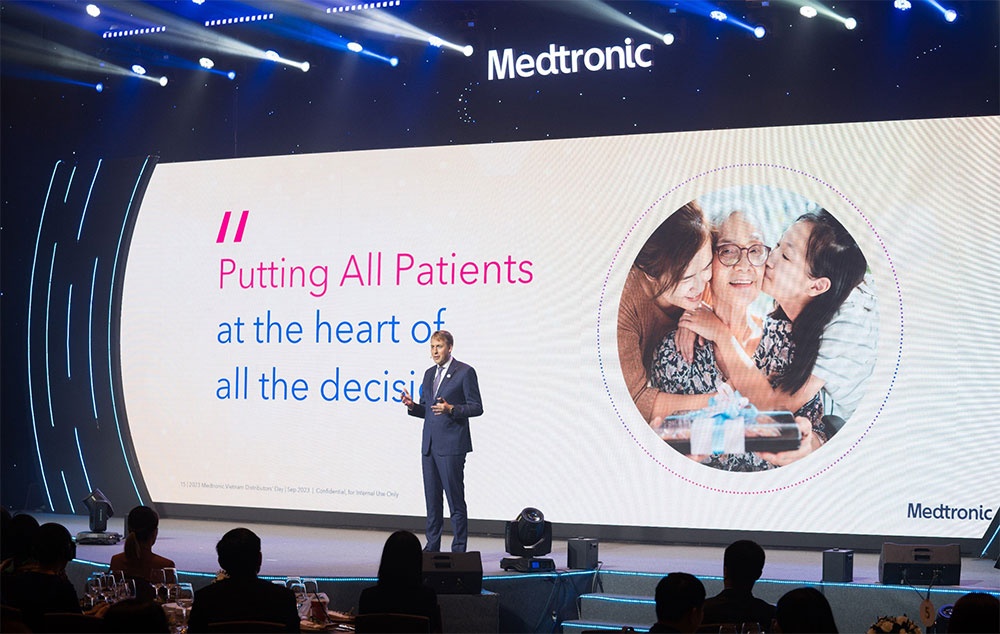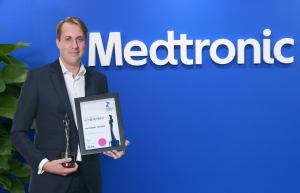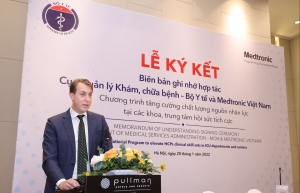Medtronic at forefront of transforming Vietnam’s healthcare
 |
| Paul Verhulst - Vice president, Mainland Southeast Asia, Medtronic |
Improving patient access
Among them, expanded patient access has been one of the top priorities for the industry. In this region, 30 per cent of the population lack access to reliable healthcare, largely due to high costs, geographical barriers and distance, limited skillsets of healthcare professionals, and antiquated hospital facilities and medical infrastructures, among others.
Take the case of Nguyen, a 60-year-old patient who has colorectal cancer – one of the most common cancers in the country. She lives in a remote village in the north of Vietnam and it takes her a day to reach Hanoi for treatment.
Nguyen’s case mirrors challenges facing Vietnamese patients who come from remote provinces with a lack of specialised healthcare. Many people are forced to travel a long distance to reach hospitals in large cities, which boast cath labs, surgical rooms, and experienced doctors to perform advanced procedures. Without these journeys, many of those people will suffer from the risks of late diagnosis and treatment.
Indeed, Vietnam has made great strides in improving its healthcare sector in recent times, by increasing both the ratio of patient beds and ratio of doctors. The country is making efforts to achieve the goal of universal healthcare coverage by 2030 as part of the United Nations Sustainable Development Goals. More than 90 per cent of Vietnam’s population have been covered with health insurance.
However, despite significant improvements in its population’s health, the gap between the quality of Vietnam’s healthcare systems in rural and urban areas remains a critical issue to be resolved.
 |
Transforming healthcare through technology and partnerships
The transformation of the healthcare sector would not be possible without technology. Medtronic has taken the responsibility to help address these patient access challenges together with our partners. We have bolstered collaboration with relevant stakeholders to increase the number of trained healthcare professionals to operate advanced medical devices in Vietnam.
Through this approach, we aim to enhance patient access to the best treatment solutions, meeting patients’ needs as articulated by patients themselves. Last year, Medtronic signed a MoU with the Ministry of Health’s Medical Examination and Treatment Administration Department to elevate healthcare professionals’ clinical skill sets in intensive care unit departments and centres.
In 2023, Medtronic inked MoUs with Hue Central Hospital, the Vietnam National Heart Association, and Hospital E. Under such partnerships, Medtronic has actively implemented capacity-building initiatives for doctors and medical staff across the country, primarily focusing on key areas of minimally invasive and innovative therapies with proven safety and efficacy in cardiovascular, medical surgical, and neuroscience.
In addition, technology also plays a critical role in treating chronic diseases. The World Health Organization estimated that non-communicable diseases now account for 77 per cent of all death and disability in Vietnam. Of these, cardiovascular disease and cancer are the two most common contributors to premature death and loss in disability-adjusted life years, followed by diabetes/chronic kidney disease.
Many of these deaths can be prevented with improved diagnosis, monitoring, and tech-enabled early-stage interventions, according to a Digital Health in Vietnam report released by KPMG.
Medtronic has harnessed the power of technology to close the world’s health gaps. By putting people first, the company continues to innovate to bring the most transformative healthcare technologies. This, coupled with partnerships, education, and advocacy, helps Medtronic dismantle barriers to care. As a result, more people can benefit from these life-transforming innovations.
In Vietnam, Medtronic has accelerated patient access to the latest medical technologies in cardiovascular, diabetes, medical surgical, and neuroscience. Take deep brain stimulation (DBS) for Parkinson’s disease, for example. DBS uses a small pacemaker-like device, placed under the skin of the chest, to send electrical signals through extensions and very thin wires to an area in the brain that controls movement. By managing some of the movement symptoms of Parkinson’s, DBS may help patients regain control.
Few hospitals can perform DBS therapy in Vietnam, and it is also difficult to provide mass training for these advanced procedures. Medtronic has collaborated with leading Vietnamese hospitals to provide training for physicians to perform DBS therapy. As a result, more Parkinson’s patients in Vietnam can enjoy an improved quality of life compared to those taking medication alone.
In addition, Medtronic also offers technology to treat atrial fibrillation with cryoablation. As one of the latest therapies, this technique is only performed at interventional cardiovascular centres, which are home to professionally trained heart rhythm specialists and modern cath lab equipment. Clinical treatment in Vietnam and around the world shows that it is one of the safest and most effective measures to treat atrial fibrillation, with a short procedure time.
Following the procedure, patients only need to stay in the hospital for one day of observation. They do not need to take medication to treat atrial fibrillation. They need to strictly follow the monitoring schedule and follow-up examinations with cardiologists.
Medtronic’s therapy offers new prospects in the treatment of atrial fibrillation in Vietnam. It not only helps reduce the risk of complications for patients but also reduces the number of hospital admissions related to atrial fibrillation, thereby contributing to reducing the burden on the medical sector due to atrial fibrillation in particular and cardiovascular disease in general.
Last year, Medtronic’s therapies improved the lives of 120,000 patients in Vietnam. This year, we strive to serve 150,000. Globally, our healthcare technologies transform the lives of two people every second of the day. Specifically, our technologies reimagine the treatment of over 70 health conditions across cardiovascular, diabetes, medical surgical, and neuroscience.
| Stakeholders need to act as one, putting patients first Stakeholders – the government, businesses, and hospitals alike – are responsible for enhancing patient access. This could mean the government launching campaigns to raise health awareness among people, businesses designing more advanced technologies, and hospitals increasing investments in healthcare facilities. To bridge the gap in the healthcare sector, Medtronic will cement partnerships with more key stakeholders to improve the capacity of health professionals and the quality of medical technology to create a healthy and sustainable society for Vietnam. |
 | Medtronic Vietnam recognised as one of Best Companies to Work for in Asia Medtronic Vietnam, a subsidiary of Medtronic Plc. (NYSE: MDT), a global leader in healthcare technology, has been named as one of the Best Companies to Work for in Asia 2021 by leading human resources magazine HR Asia. |
 | Medtronic Vietnam and Ministry of Health collaborate to elevate clinical skills among professionals Medtronic Vietnam, a subsidiary of Medtronic PLC – a global leader in healthcare technology – and the Medical Examination and Treatment Administration Department under the Ministry of Health have signed an MoU to elevate healthcare professionals' clinical skill sets in ICU departments and centres. |
What the stars mean:
★ Poor ★ ★ Promising ★★★ Good ★★★★ Very good ★★★★★ Exceptional
 Tag:
Tag:
Related Contents
Latest News
More News
- Rising consumption and travel fuel ‘Tet season’ stocks (February 11, 2026 | 11:43)
- Education as strategic capital: why Dwight School Hanoi represents a long-term investment in Vietnam’s future (February 10, 2026 | 19:00)
- Green logistics–the vital link in the global energy transition (February 09, 2026 | 19:35)
- Wages and Lunar New Year bonuses on the rise (February 09, 2026 | 17:47)
- Temporary relief for food imports as businesses urge overhaul of regulations (February 07, 2026 | 09:00)
- Opella and Long Chau join forces to enhance digestive and bone health (February 06, 2026 | 18:00)
- Vietnam-South Africa strategic partnership boosts business links (February 06, 2026 | 13:28)
- Sun PhuQuoc Airways secures AJW Group support for fleet operations (February 06, 2026 | 13:23)
- Pegasus Tech Ventures steps up Vietnam focus (February 05, 2026 | 17:25)
- The generics industry: unlocking new growth drivers (February 04, 2026 | 17:39)




















 Mobile Version
Mobile Version